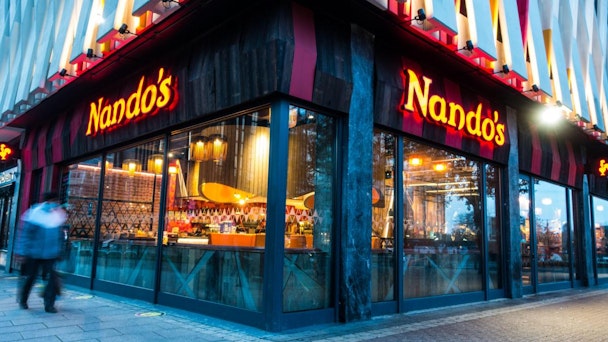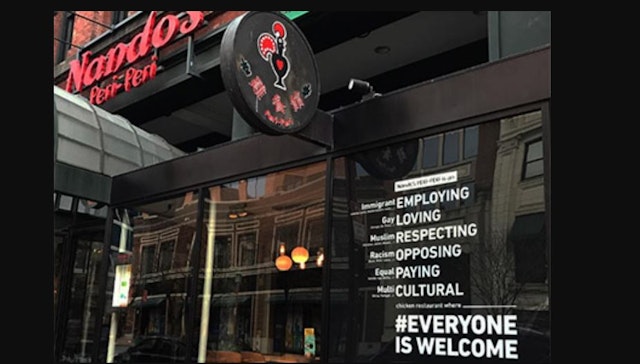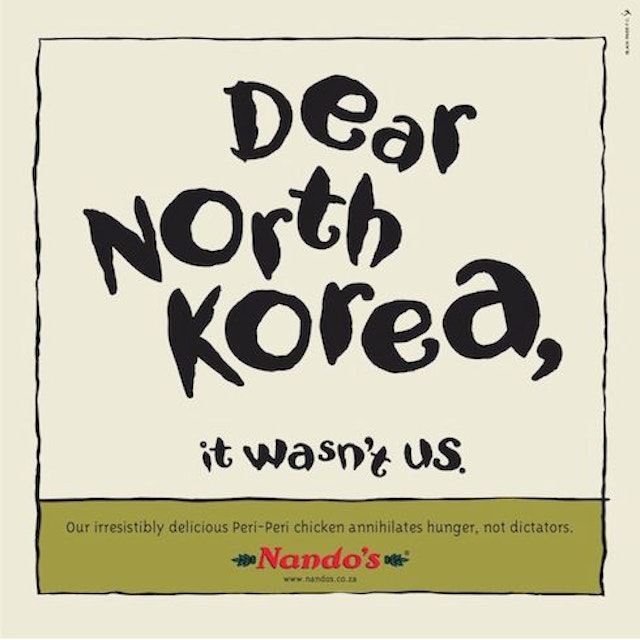‘If you can’t back words with action, stay away’: Nando’s brand boss on when to get political
Dictators, presidents and now anti-vaxxers – it seems there are very few controversial subjects that Nando’s won’t use its marketing to comment on. The Drum catches up with the chicken chain’s chief brand officer for North America to find out how he knows when to take a stand and how he prepares for the inevitable backlash.

‘If you can’t back words with action, stay away’: Nando’s brand boss on when to get political
Last week, Nando’s launched a campaign poking fun at the anti-vax movement to promote its app. ’Don’t be an Anti-Apper,’ it declared through a series of short selfie-style videos that mimicked the social posts of anti-vaxxers.
Copy ranged from ’I ordered Nando’s directly from my phone once, but I realized no one has studied the side effects,’ to ’I don’t want the Nando’s app on my phone and sure as hell don’t want my phone implanted with 5G!’
It’s not the first time Nando’s has made comment on political and social movements. The brand was founded in South Africa in the late 1990s during the apartheid rule and, it says, emerging from that period was formative for its brand identity.
Here, Sepanta Bagherpour, the chief brand officer for Nando’s North America, tells us why political satire is not seen as risky marketing and explains the thinking that goes on behind the scenes for its most controversial campaigns. Answers have been edited for clarity.
Why does the brand tackle these issues in its marketing?
I’ve been at Nando’s for a decade and a half. My grounding was at Nando’s South Africa. Nelson Mandela was free, the apartheid machine receded and as the first democratically elected party succeeded, there was enormous optimism. Business and people flourished. But brands communicated as if nothing had happened. We came out of a crazy thing, so why can’t we talk about it?
This period was formative and is forged into our DNA. We took it upon ourselves then to comment, have an opinion and do social commentary in areas where other brands wouldn’t take positions.
[One of its most infamous ads saw Robert Mugabe, the then-president of Zimbabwe, sitting alone in a dining room reminiscing about his friendships with fellow dictators. Scenes of a water-gun fight with Moammar Gaddafi, karaoke with Mao Zedong and making sand angels with Saddam Hussein play out against the song Those Were the Days. The ad was so controversial it was later taken off air.]
[In this ad from 2009, Nando’s poked fun at spending behavior of South Africa’s parliament ministers.]
Overall people appreciate our position. We take a risk and credit the audience with intelligence. And over time we’ve become more deliberate on what we talk about. We want it woven into our purpose. We have identified tackling social issues as a core pillar in how our brand can change lives.
We did [the inauguration campaign, below] for our people. Nando’s staff were wondering what Trump would mean for them, for our values, for our brand. We didn’t take a side, we just explained where we stand. And it resonated with people around the world. We see that if we do it right, it will strike a chord.

[After the election of Donald Trump as president in, tensions were high in the US. Ahead of the inauguration in January 2017, Nando’s set out its stall with a campaign called ’Everyone is Welcome’. Bold OOH posters and print ads read: ’Nando’s Peri-Peri is an Immigrant Employing, Gay Loving, Muslim Respecting, Racism Opposing, Equal Paying, Multi-Cultural chicken restaurant where #Everyone Is Welcome.’]
Why make anti-vaxxers the subject of this campaign?
It goes without saying that in the last two-and-a-bit years, Covid has caused enormous challenges for everyone and most notably for the restaurant category around the world. It’s a modern marvel of science, a miracle that we’re controlling this. And Nando’s is all for it – we are all for the science the vaccine is built upon. But we are respectful and do it through good humor.
Was it difficult to get buy-in from the CEO and other senior stakeholders?
You’re 100% right, it’s not easy, but we have muscle memory. When these discussions come up in the organization, there’s a good ear for it. Everyone approaches it with caution, for good reason. With the ’Anti-App’ campaign, it was relatively easy. Of course, there’s a huge responsibility on all of our shoulders to be on the right side and make sure we don’t drink too much of our own Kool-Aid, but within the organization, from a leadership perspective, we believe in the science. We’ve seen the impact the Covid surge had on our business and the hospitality category, which is one of the biggest employers of people in the US.
In the early days of Covid, our staff showed up to the frontline when there was no luxury of working from home. They fed key workers and then they were quick to take up all the necessary vaccine recommendations. We have some restaurants with 100% vaccination rates and if there’s staff with medical and religious reasons who can’t, we’re working with them to keep them safe.
And our core markets are Washington DC, Maryland and Chicago, where 80% people have had one dose. So from a public engagement perspective, most people are our side. We knew the gross majority of people would have a positive view of the campaign and the negativity would come from a minority.
[The TV ad for Nando's Anti-App campaign, released in March 2022]
What has been the reaction so far?
It’s very early days. A few comments I’ve seen have questioned why we’re doing this and that we’re potentially being insensitive, but those handful of engagements are eclipsed by the very positive engagement we’ve had.
How do you prepare staff, such as your social media managers, to handle any backlash to your riskier political ads?
That’s the biggest thing next to assembling the machine that is the campaign. The short answer is: very carefully, very thoroughly and respectfully. We discuss deeply and we hold an open forum for people to question and tell us how they feel about an issue. That ultimately dictates how we will engage with something.
We also develop a whole load of contingency materials that go into the kind of challenging questions we’ll get from the media and public. We consider all the feedback and although we don’t waver from our position we try as much as possible to listen to people’s views and how they sit with the aims of the campaign.

[Following the death of North Korean leader Kim Jong II in 2011, Nando's created a social media campaign in less than an hour]
As a brand with marketing that plays off the news agenda, how do you know when a topic is off limits?
I’d love to give you a straight up algorithm, but there’s several reasons. We ask ourselves if we have the right to comment on it. so: is there a direct link from what we do as a business? Where does it sit with our values? And can we follow up those words and statements with action? If not ,it’s just profiteering. If you can’t back your words with action then stay away from it.
Then we look at how people feel internally by interviewing people in the company. Would they feel comfortable with the brand getting involved, making statements and taking a stand? That has a massive impact. Then we’ll take it to consumers. So it’s a really broad process.
All brands need to take responsibility for building society. But only do it through comms if you have the buy-in from your people to do so. Just to add more noise to the fray is not productive. I wouldn’t encourage marketers to do it without some thought into what it will achieve other than some headlines.

